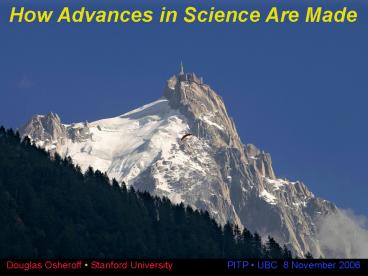How Advances in Science Are Made PowerPoint PPT Presentation
Title: How Advances in Science Are Made
1
How Advances in Science Are Made
Douglas Osheroff Stanford University
PITP UBC 8 November 2006
2
Those discoveries that most change the way we
think about Nature cannot be anticipated. How,
then, are such discoveries made, and are there
research strategies that can substantially
increase ones chance of making such a discovery?
3
A Linked Chain of Discoveries and Inventions
4
1853-1926
5
Heike Kammerlingh Onnes
Nobel Prize for Physics 1913
1853-1926
6
Gilles Holst
7
Relevant Research Strategies
Use the best instrumentation available Dont
re-invent Borrow the technologies you can
Look in an unexplored region of the landscape
Failure might be an invitation to try something
new Be aware of subtle unexplained behavior,
dont dismiss it!
8
1894-1984
NL 1978
9
(No Transcript)
10
(No Transcript)
11
1954
Columbia University Charles Townes
Jim Gordon The Ammonia Maser II gt
Maser parametric amplifier
Townes Nobel Prize 1964
12
Karl Jansky At Bell Laboratories in 1933
1905-1950
13
Wilkinson
14
(No Transcript)
15
(No Transcript)
16
(No Transcript)
17
(No Transcript)
18
(No Transcript)
19
W-MAP
20
The process of advancing science often leads to
inventions and technologies that directly benefit
mankind. However, it is impossible to know from
where the advance will come that might solve a
problem facing mankind. Consider, for example,
nuclear magnetic resonance.
21
(No Transcript)
22
Chemical and Spin Shifts in NMR
23
Fourier Transform and 2D NMR
24
Richard Ernst Nobel Prize Chemistry 1991
25
Three Dimensional Conformation of Organic
Molecules Kurt Wütrich
in Aqueous Solutions
26
Kurt Wütrich Nobel Prize for Chemistry 2002
27
Magnetic Resonance Imaging MRI
28
(No Transcript)
29
Functional Magnetic Resonance Imaging FMRI S.
Ogawa
30
The Discovery of Superfluidity in 3He 1971-72
31
The History
1948 Ed Hammel led a group at Los Alamos who
first liquified 3He 1950s Physicists study
normal liquid behavior of 3He (WheatleyLandau)
1957 Bardeen, Cooper and Schrieffer explain
superconductivity (BCS) 1959 Theorists predict
3He would become a BCS superfluid at 80 mK
1965 John Wheatley had cooled 3He at SVP to 2 mK,
no superfluidity ..new technologies..
1964 David Edwards Discovered the Finite
Solubility of 3He in 4He 1965 Henry Hall built
the first 3He-4He dilution refrigerator
32
Christmas 1953
33
1950
34
(No Transcript)
35
(No Transcript)
36
Conversational Chinese
37
(No Transcript)
38
Tinitial 22 mK
39
Tinitial 15 mK
40
(No Transcript)
41
(No Transcript)
42
(No Transcript)
43
(No Transcript)
44
(No Transcript)
45
(No Transcript)
46
(No Transcript)
47
(No Transcript)
48
(No Transcript)
49
Osheroff, Richardson and Lee 1996
50
(No Transcript)
51
- Strategies
- Utilize new technologies.
- View nature from a new perspective
or in a different realm. - Dont give up when things are going badly.
- Failure may be an invitation to
try something new. - Spend a little time doing something different.
- Curiosity driven research is
fun, and can be rewarding! - Avoid too many commitments.
- The demands of good research
do not adhere to a schedule. - Back off from what you are doing occasionally to
gain a better perspective on the task at hand. - We become myopic when we focus too tightly
on our work.
52
Basic Research At Bell Laboratories 1977 Good
research was research that taught us something
new about Nature. .Try something else.
Nuclear Antiferromagnetism in Solid 3He Weak
Localization in Two Dimensions
53
- Strategies
- Change the subject of your research occasionally.
- After a while we lose perspective
as well as run out of ideas. - Note the predictions of theorists, but dont
trust them to be correct. - Good theorists have a nose for
interesting physics, but we should - not expect them to have all the
details correct. Build flexibility into - your experiments.
- Collaborate to add additional expertise.
- Particularly with those whose
skills complement you own.
54
Bardeen, Cooper and Schreiffer Anderson,
Pomeranchuk.
Edwards and Hall
Bloch and Purcell
Hammel, Wheatley Landau
Stratey and Adams
55
Advances in science are seldom made by
individuals alone. They result from the progress
of the scientific community, asking questions,
developing new technologies to answer those
questions, and sharing their results and their
ideas with others. To have rapid progress, one
must support scientific research broadly, and
encourage scientists to interact with one another
and to spend some of their time satisfying their
own curiosities. This is how advances in science
are made.
56
Thats How Advances in Science Are Made!
57
(No Transcript)

